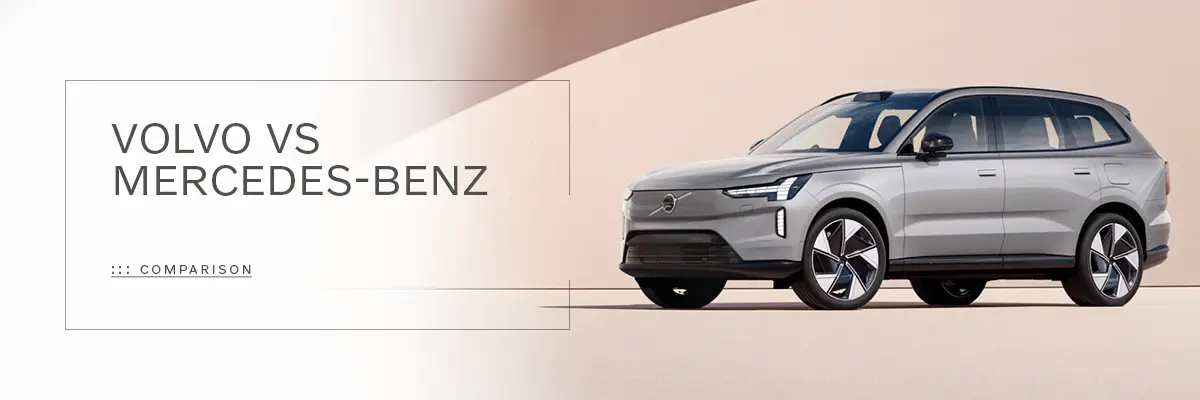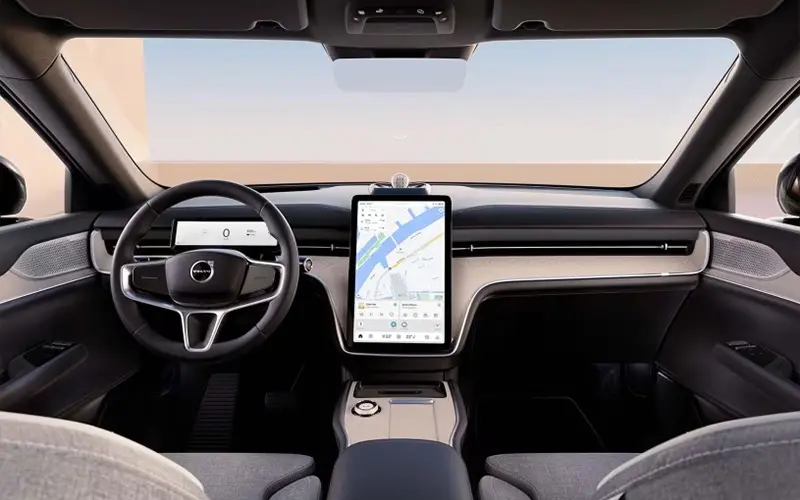
Volvo is Sweden's largest automaker, with a history stretching back nearly a century. But when you talk about luxury automotive brands, comparisons to Mercedes-Benz are all but unavoidable, as it was the world's first automaker, and remains an important force in the luxury vehicle market. But how do the two actually compare? We put together this guide comparing these well-established European luxury brands.
Volvo XC90 VS Mercedes-Benz GLE
 |  | |
|---|---|---|
| 2025.5 Volvo XC90 Core B6 AWD | VS | 2025 Mercedes-Benz GLE 350 4MATIC |
| $64,645 | MSRP | $64,350 |
| 295 HP / 310 LB-FT TQ ✓ | Horsepower / Torque | 255 HP / 295 LB-FT TQ |
| 6.4 seconds ✓ | 0-60 Time | 7.0 seconds |
| 7 ✓ | Seats | 5 |
| 10 ✓ | Speakers | 8 |
| 4-zone ✓ | Climate Control | Dual-zone, 4-zone available as an extra-cost option |
| Standard ✓ | Air Purifier | Optional |
| Standard ✓ | Built-In Music Streaming | Optional |
| Standard ✓ | Panoramic Roof | Optional |
| Standard ✓ | Lane Keeping Assist | Optional |
First up we're looking at Volvo's extremely popular XC90 SUV, as well as the almost identically priced Mercedes-Benz GLE. There is actually a version of the XC90 with the B5 drivetrain, which makes about the same power as the GLE for several thousand dollars less, but we went with the B6 to show what the same money gets you from each manufacturer. And to start with, it gets you more power from Volvo, enough for more than half a second difference in 0-60 times. You get more seats with the XC90, at least as standard equipment. There is an optional third row of seats for the GLE that takes the capacity up to 7, but that costs extra.
Standard equipment is really quite important to this comparison, since the starting prices are so similar. And it's impossible to miss the fact that you get a lot more as standard equipment with the XC90. Mercedes offers quite a bit of equipment for the GLE, but a large percentage of it costs extra. It's unfortunately pretty normal for German automakers to nickel-and-dime you on options, and that's especially obvious when comparing them to Volvo. In fact, not only is the standard stereo system on the XC90 superior to the one found in the GLE, the optional premium stereo in the XC90 also has more speakers and a higher-wattage amplifier than the optional premium stereo in the GLE.
Volvo S90 VS Mercedes-Benz E-Class
 |  | |
|---|---|---|
| 2025 Volvo S90 Plug-In Hybrid Plus | VS | 2024 Mercedes-Benz E 450 4MATIC |
| $66,845 ✓ | MSRP | $70,850 |
| 455 HP / 523 LB-FT TQ ✓ | Horsepower / Torque | 375 HP / 369 LB-FT TQ |
| 66 MPGe ✓ | Fuel Economy (combined) | 31 MPG |
| 42.2 inches / 40.4 inches ✓ | Legroom (front / rear) | 41.3 inches / 35.8 inches |
| 38.7 feet ✓ | Turning Radius | 39.4 feet |
| 13.5 cubic feet ✓ | Trunk Space | 12.7 cubic feet |
| 10 ✓ | Speakers | 6 |
| 19 inches ✓ | Wheels | 18 inches |
| 4-zone ✓ | Climate Control | Dual-zone |
| Standard ✓ | Heated Steering Wheel | Optional |
Next up is a pair of sedans, and we've chosen the optional, more powerful drivetrains because they're so close in price. Price is an important factor here, since the more powerful drivetrain in the S90 is a plug-in hybrid, and while a plug-in hybrid version of the E-Class is available, it is also a specialty AMG model that is priced far too high for this comparison. A further disadvantage comes in the form of the power output of the E 450 4MATIC, which is noticeably lower than what you get in the S90 Plug-In Hybrid, despite the slightly higher price. Fuel economy is also an area where the S90 is the clear winner, part of the advantage of having a plug-in hybrid.
The S90 offers more legroom, especially in the back seat. And while, for most sedans, this comes at the expense of their trunk space or turning radius, the S90 beats the E-Class in both of these areas as well. We can see that standard equipment is once again a strength for Volvo, with more speakers, bigger wheels, and a more advanced climate control system. And even though the E 450 4MATIC is the higher of the E-Class trims, equipment like a heated steering wheel or heated rear seats are optional extras, whereas on the S90 they're standard.
Volvo EX90 VS Mercedes-Benz EQE SUV
 |  | |
|---|---|---|
| 2025 Volvo EX90 Twin Motor Plus | VS | 2025 Mercedes-Benz EQE 350+ SUV |
| $81,290 ✓ | MSRP | $77,900 |
| 402 HP / 568 LB-FT TQ ✓ | Horsepower / Torque | 288 HP / 417 LB-FT |
| 5.7 seconds ✓ | 0-60 Time | 6.4 seconds |
| 111 kWh ✓ | Battery Capacity | 96 kWh |
| All-wheel drive ✓ | Drivetrain | Rear-wheel drive |
| 7 ✓ | Seats | 5 |
| 67.6 cubic feet ✓ | Max Cargo Capacity | 55 cubic feet |
| 4,850 pounds ✓ | Not rated | |
| Standard ✓ | Head-up display | Optional |
| Standard ✓ | Heated Rear Seats | Optional |
For our last comparison, a look into the future. Volvo is shifting to an all-electric lineup in the coming years, and Mercedes is similarly hard at work growing their EV lineup, so we figured it would be a good idea to compare Volvo's electric flagship, the EX90, to the similarly priced Mercedes EQE SUV. And once again, whether you're talking about gasoline or electric, the same money gets you less power and slower acceleration with Mercedes. There isn't a huge difference in range, 310 miles for the EX90 compared to 302 for the EQE, but it's obviously noteworthy that the extra power you get with the EX90 comes with no compromise in range at all. The EQE 350+ is rear-wheel drive, but there is an AWD version that actually costs the same and the RWD version. That sounds great, but the EQE 350 4MATIC does come with a smaller battery than the EQE 350+, so Mercedes is really just giving you a choice of which disadvantage you want. The EX90 has a bigger battery than either of these, and AWD at the same time.
You get two more seats in the EX90, and unsurprisingly, folding them down gives you more cargo capacity as well. And if you want to bring a lot more cargo, the EX90 is rated to tow up to 4,850 pounds. That beats the EQE, even though that's not especially difficult, since the EQE isn't rated for towing at all. And once more, the Volvo comes with more standard equipment. Even just selecting the head-up display and heated rear seats will almost completely wipe out the EQE's small price advantage, and you'd still have to live with less power and a smaller battery.

Winner - Volvo
The differences between the two brands are pretty clear, Volvo offers better power, better standard equipment, and several plug-in hybrid models. And while looks are subjective, the Scandinavian sensibility that Volvo incorporates into their design is sophisticated and attractive in a way that German brands tend not to be able to accomplish. Let Motorcars Volvo Cars help you find the Volvo that's right for you.